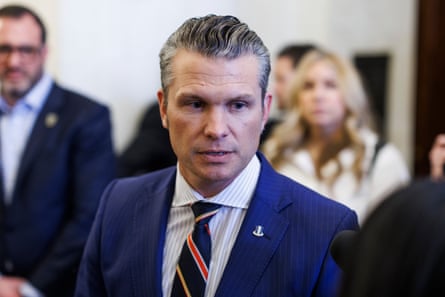During Donald Trump’s first administration, his vice-president became the target of an angry mob amid calls for him to be hanged. His top diplomat was fired via Twitter and branded “dumb as a rock”. His first attorney general was given his marching orders and called “very weak” and “disgraceful”.
Despite it all, Trump has had no trouble recruiting a team eager to serve when he returns to the White House in January, even if his initial pick for attorney general, Matt Gaetz, was forced to back out amid allegations of sexual misconduct.
Trump’s cabinet for his second term is nearly complete just three weeks after his stunning election victory over Kamala Harris. To his Maga (Make America great again) followers it is a team of all the talents, poised to enforce an agenda of mass deportations, gutting the federal bureaucracy and “America first” isolationism.
To critics with memories of Trump’s first cabinet, however, it is an ideological hodgepodge glued together only by unquestioning fealty to the incoming 78-year-old commander-in-chief. Some have compared it to the gathering of exotic aliens in the Star Wars cantina. Others predict they will soon be fighting like rats in a sack as different factions compete for Trump’s attention.
“The same thing that happened last time will happen this time,” said Rick Wilson, co-founder of the Lincoln Project, an anti-Trump group. “He cannot resist chaos. It is his drug. He will eventually start doing what he always does and turn on different people and start sandbagging his own choices for these various jobs.
“It’s that pattern he has. He comes out one day and says, ‘I love so and so,’ and then the next he’s talking to his friends saying, ‘Hey, you think Tillerson’s doing a good job or is he screwing me over?’ Those things are patterns we’ve seen in Trump’s personal life, his business life and his prior administration. An 80-year-old man is not going to be a changed person.”
Eight years ago, Trump arrived in Washington as a political neophyte in need of a helping hand. He appointed a cabinet that included traditional conservatives of whom he knew little. This time, he returns as a former president who has transformed the Republican party and prioritises unwavering loyalty and adherence to his agenda over qualifications and experience.
This was most obvious sign of this was the selection of Gaetz for attorney general, a position key to Trump’s plans to deport undocumented immigrants, pardon January 6 rioters and seek retribution against those who prosecuted him over the past four years. Gaetz’s replacement, Pam Bondi, is a longtime ally who declared after Trump was criminally charged that the “investigators will be investigated”.

There was a similar motivation behind the choice of Pete Hegseth, a former Fox News host, for defence secretary despite him having no track record in government. Hegseth fits with a drive to purge perceived “woke” policies from the military. He has denied allegations made in a police report that he sexually assaulted a woman in 2017 at a conference in California.
Trump’s selections are sending mixed economic signals. The nomination of the Wall Street billionaire Scott Bessent to head the treasury implies an attempt to reassure markets (it is also notable because Bessent used to work for George Soros, the target of countless rightwing conspiracy theories). But Howard Lutnick, nominated for commerce secretary, has praised the president-elect’s proposed use of tariffs. Vice-president-elect JD Vance is also among those pushing a more protectionist agenda on trade.
And Trump’s pick of Lori Chavez-DeRemer, a congresswoman from Oregon, as labor secretary could be one of the rare selections that draws bipartisan support. She is considered one of the most union-friendly Republicans in Congress, and her selection was viewed as a way for Trump to reward union members who voted for him.
On foreign policy, Trump made a relatively conventional choice in Marco Rubio for secretary of state. The Florida senator has advocated in the past for a muscular foreign policy with respect to foes including China, Iran and Cuba. But the president-elect also intends to put Tulsi Gabbard, a former Democrat who has previously made statements sympathetic to Russia, as director of national intelligence.
Other picks include Brooke Rollins, president of the America First Policy Institute thinktank, as agriculture secretary; Doug Burgum, a wealthy former software company executive, as interior secretary; and Linda McMahon, former chief executive of World Wrestling Entertainment, as education secretary – overseeing an agency that Trump pledged to eliminate.
Then there is Robert Kennedy Jr, an anti-vaccine activist and sceptic of established science. Kennedy’s career as an environmental lawyer could put him at odds with Trump’s “drill, baby, drill” philosophy and figures such as Lee Zeldin, set to lead the Environmental Protection Agency with a mandate to slash environmental regulation. Kennedy has also been condemned by Mike Pence, the former vice-president, and other social conservatives for supporting abortion rights.
Outside the cabinet, Elon Musk and Vivek Ramaswamy’s “Department of Government Efficiency”, while lacking official authority, signals a strong push for drastic budget cuts and deregulation. And despite campaign trail denials, Trump has embraced Project 2025, a controversial plan from the Heritage Foundation thinktank, by appointing figures such as Russell Vought as director of the Office of Management and Budget.
after newsletter promotion
The person who will have to make sense of it all is Susie Wiles, a longtime Florida political operative who will become the first woman to serve as White House chief of staff. She will hope to avoid the fate of chiefs of staff who failed to last the course of Trump’s first term as, like a sports coach, she seeks to make disparate players gel into a cohesive whole.
In an analysis for the New York Times, David Sanger, who has covered five US presidents, identified “a revenge team”, “a calm-the-markets team” and “a government shrinkage team”, commenting: “How these missions will mesh and where they will collide is one of the biggest unknowns of the incoming administration.”
But others argue that the cabinet’s range of experiences and worldviews will pale into insignificance when set against their devotion to the Trump cult. Kurt Bardella, a Democratic strategist, said: “Regardless of whatever individual ideological leanings these people have had at varying points in their adult lives, it’s largely irrelevant because the only litmus test we have seen put forward is absolute fealty to Donald Trump.
“As we have seen in the Republican party overall, absolute fealty to Donald Trump overshadows any ideological belief. We could take almost every issue that used to be a part of the Republican party and show how the party has moved to a diametrically opposite position. This is not a party governed by ideology any more. It is governed by personality. It is governed by loyalty to Donald Trump.”
Bardella, a former Republican congressional aide, added: “They’re all going to get in a room and they’re just going to go: ‘Here’s what we think. What do you think, boss? Oh, OK, well, that’s what we’re all going to do.’ The idea that there’s going to be ideologically rooted debate, vigorous debate happening in the Trump administration is absurd. It’s laughable.”
Notably, Trump’s cabinet is more diverse than in his first term, although it again has only three people of colour in secretary positions. Rubio would be the first Latino to serve as America’s top diplomat; Bessent could become the first openly gay Republican cabinet member confirmed by the Senate; Gabbard would be the first director of national intelligence from the Pacific Islander community.
But seasoned Trump watchers detect no method in the madness and suspect that the former reality TV star will once again act on impulse and thrive on conflict. Chris Whipple, the author of The Gatekeepers, a book about White House chiefs of staff, said: “I don’t think there’s any evidence that Trump has learned anything about governing since his first term.
“There’s a lot of wishful thinking among a lot of commentators that OK, he’s had four years in office, he learned a lot, he’s had all this time to plan with Project 2025 and the America First Policy Institute and he’s got his act together. I just don’t think that’s true. I don’t see any evidence that there’s any sort of plan here other than ‘this guy looks good for that job, and Robert F Kennedy Jr has got a cool last name’.”

.png) 1 month ago
6
1 month ago
6













































